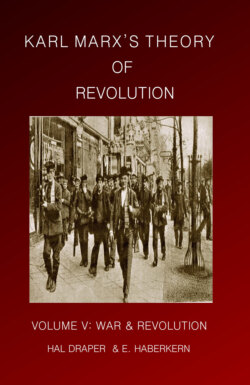Читать книгу Karl Marx’s Theory of Revolution Vol V - Hal Draper - Страница 8
На сайте Литреса книга снята с продажи.
2. Lenin, Potresov and Kautsky
ОглавлениеIn 1915, Lenin drafted an article titled “Under a False Flag” which was not published until 1917.2 In it he outlined his own position which he claimed was also that of Marx and Engels. He was to repeat this argument in several articles and resolutions which were published during the war but this draft presented his schema in greater detail.
Lenin’s article was provoked by the anti-Kautsky polemic of the prowar socialist, Alexander N. Potresov, writing in the magazine Nashe Dyelo. Potresov attacked Kautsky for not choosing sides in the war.
One recent biographer describes Kautsky’s dilemma in 1914.3 At the start of the war he had hoped to persuade the SPD delegation in the Reichstag to follow the example of Bebel and Liebknecht during the Franco-Prussian war and abstain in the vote for war credits. When it became clear that this would not be possible, he tried to get the party delegation to denounce the imperialist ambitions of all sides which had brought on the war and limit support to the government to what was required solely by the need to defend the country from attack. When this maneuver also failed, Kautsky was faced with the choice between concealing his antiwar sentiments and splitting the party in the midst of war.4 He rejected the second alternative and confined his public pronouncements to justifying “defensive wars” by citing the record of Marx and Engels while rejecting the annexionist plans of all the belligerents.5
For Potresov that was not good enough. It was no good arguing that Marx and Engels were for the right of each nation to self defense. That was just a device for avoiding any stand on the war. That was not what Marx and Engels had done. Their writings provided, he claimed, precedents for his prowar politics.
Potresov chose for his main precedent Louis Bonaparte’s Italian campaign of 1859. It was a particularly useful precedent because all sides were repugnant not only to socialists but to many halfway decent liberals. In this incident, which was pretty obscure even by 1915, Bonaparte, in secret alliance with the Russians, attacked Austria’s Italian possessions. The announced aim of the campaign was to liberate Italy. And Garibaldi’s troops were involved in the fighting—basically as auxiliaries of the French. The real aim was to cement a Franco-Russian alliance against Austria and keep the German states in turmoil. And, in the end, the Italian revolutionaries were swindled by Bonaparte.
In this crisis, Potresov claimed that Marx and Engels, when forced to decide “which Power in the Concert of Europe was the main evil: the reactionary Danubian monarchy or other outstanding representatives of this Concert,” refused “to step aside and say that the two are equally bad.”6 Marx and Engels, in Potresov’s version of history, urged intervention by Prussia in defense of Austria and in the name of Germany’s national interest. Lassalle, the other “great teacher” of the movement, used the same “lesser evil” methodology. Only he came to the opposite conclusion and supported Bonaparte. No matter. The important thing is the “Marxist” method not the conclusion. And Potresov wanted to use this “Marxist” method to decide which of two very reactionary sides in World War I was the main evil. Presumably, in 1915, Potresov was more concerned with coming to the correct (that is, pro-Entente) conclusion.
Lenin accepted Potresov’s argument while rejecting the conclusion. He agreed that Marx and Engels threw their support to one side or another “notwithstanding the highly reactionary character of the governments of both belligerent sides.”7 Lenin, in fact, went further than Potresov or Kautsky. He insisted that “no other question could have been posed at the time.”8 He corrected Potresov’s phrasing of the question “the success of which side is more desirable” to “the success of which bourgeoisie was more desirable.”9 Both men claimed to be quoting, or at least paraphrasing, Marx but neither bothered to point to a reference. Everybody agreed, without need of evidence, that Marx was prowar in 1859, and so were Engels and Lassalle.
